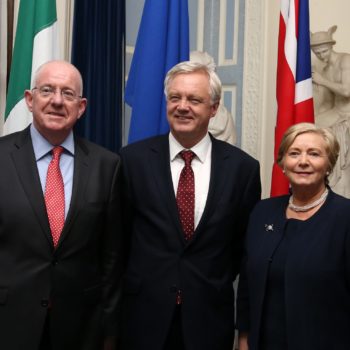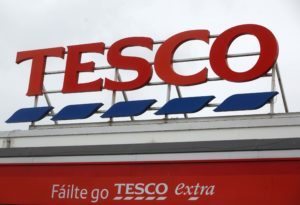Brexit – batten down the hatches

Dan's Digest with Dan White: Views on the latest economic and political news
10 October 2016
British Prime Minister Theresa May’s announcement at the Conservative Party conference that the UK would trigger Article 50 by the end of March 2017 marks the end of the “phoney war” phase of Brexit.
Now that a firm date has been set, which will see the UK exit the EU by mid-2019 at the latest, any hope that the 23 June referendum result could be somehow finessed and that things could continue pretty much as before is now gone. Brexit, most likely “hard Brexit”, is now for real.
Irish implications
What does this mean for this country? Sterling fell even further following Mrs May’s announcement, piling even more pressure on indigenous Irish exporters – something that is already feeding through into the export figures. Weaker sterling hasn’t hit the tourism sector yet but it will, and soon. And sterling almost certainly has even further to fall with IBEC predicting euro/sterling parity within two years of Brexit. What will this do to Irish companies either doing business with UK customers or competing with UK companies?
One thing it almost certainly means is that the economic growth forecasts which underpinned the “fiscal space” upon which the parties based their general election promises are now only waste paper.
Border controls
As Brexit moves from the realm of the hypothetical to the real, we are going to hear an awful lot more about border controls. If the 23 June referendum result was about anything it was about immigration into the UK. A post-Brexit UK will almost certainly insist on imposing controls on the entry of EU nationals, including Irish people, into the UK.
What will the reaction in this country to the end of the common travel area that has existed between us and the UK since 1922 be? How will Irish people feel about giving up the automatic right to work in the UK, something which millions of us have done since independence, in order to retain a right to work in Brussels or Frankfurt that very few of us have ever exercised?
Meanwhile it is becoming increasingly clear that post-Brexit UK, excluded from the single market, will instead opt for a low-tax, low-cost, deregulated economic model. Outside the EU it will no longer be bound by its budget deficit or state aid rules and will be able to do pretty much what it likes on company tax.
Facing a formidable competitor
Meanwhile, if the European Commission’s Apple tax judgement is upheld – which it probably will – this country will be facing a formidable competitor in post-Brexit UK for foreign direct investment. Cheaper sterling, which will cause all sorts of problems for this country, will also give the UK a huge competitive advantage over the Eurozone countries, including Ireland.
All of this represents a clear and present danger to this country. The government’s response up to now, the establishment of an “all-Ireland civic forum” on Brexit earlier this month hardly inspires confidence.
With earlier hopes, or should that be delusions, that Brexit wouldn’t amount to very much having been shattered by Mrs May’s Article 50 announcement, what does the future now hold for us in this country? Now that it is clear that our earlier complacency was seriously misplaced, where do we go from here?
Not happening in isolation
Brexit isn’t happening in isolation. As the UK prepares to exit the EU, there are signs that the long-running Eurozone banking crisis, which has never really gone away, has taken a turn for the worse. While the problems of the Italian banks, with about €360bn of bad loans – a fifth of the total, have been well documented, the problems of the German banks have up to now attracted less attention. That has changed following leaks that the US Department of Justice is seeking to fine Deutsche Bank, Germany’s largest bank, a massive $14bn.
With the Deutsche share price having fallen by more than half so far this year, that’s almost as much as the bank’s total market value. Investors are now convinced that paying a fine of the magnitude being demanded by the Feds would force Deutsche to raise fresh capital.
A new euro crisis?
Just for good measure Commerzbank, Germany’s second-largest bank, has also hit a spot of bother. It has announced a restructuring that will see it fire almost 20% of its 51,000 workforce. It is also scrapping its dividend.
Brexit, a German banking crisis, can a new euro crisis be far behind? Even if the Eurozone somehow muddles through it is clear that the economic tailwinds this country has enjoyed over the past three years, an extremely favourable euro/sterling exchange rate, a Eurozone recovery and low energy prices, may be about to go into reverse.
As 2017 comes into view it is already clear that Brexit will be the big story for this country in the new year. We had better batten down the hatches and hope that we won’t be submerged by the coming storm.
Supermarkets selling more for less

Tesco said that “whilst top-line growth in value terms was held back by our continued investment in lower prices, we retain our leading position in the market in volume terms”
With a 0.3% increase in its Irish sales to €1.22bn for the six months to the end of August, is the worst now over for Tesco Ireland?
The, admittedly minuscule, sales increase is the good news. The bad news is that Tesco’s share of the Irish grocery market now stands at just 21.6%, down from 24.6% three years ago, according to figures compiled by Kantar Worldpanel. This puts it behind SuperValu in joint second place with Dunnes Stores.
The 0.3% sales increase at Tesco Ireland compares to a 3.7% fall for the same period last year. Unfortunately, the Tesco half-year results don’t provide any more detail but, reading between the lines, it would appear that the sales increase was driven by lower prices, and presumably, lower margins.
“Whilst top-line growth in value terms was held back by our continued investment in lower prices, we retain our leading position in the market in volume terms thanks to a strong performance in fresh food,” according to the interim results statement.
With Musgrave’s SuperValu chain recording unchanged sales of €2.6bn in 2015, what the Tesco interim results demonstrate yet again is just how tough the grocery market has become for the traditional supermarkets as the German discounters Aldi and Lidl, whose combined market share has increased from 18.2% to 23.1% over the past three years, continue to ramp up the pressure.


 Print
Print





Fans 0
Followers